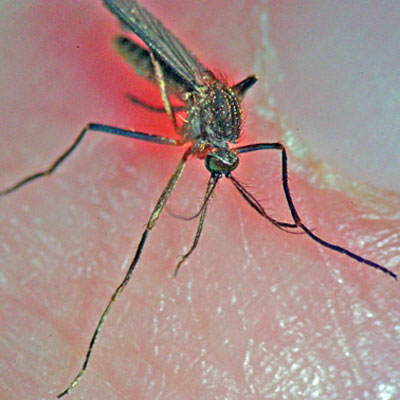
Good Morning!
Are you familiar with Eastern Equine Encephalitis (EEE)? EEE is vectored by mosquitoes and a concern for Florida residents, particularly during the summer months. The Florida Department of Health posts weekly updates regarding various arbovirus diseases of concern, and the latest report is available at: http://www.floridahealth.gov/diseases-and-conditions/mosquito-borne-diseases/surveillance.html
Both Levy and Hillsborough counties each have a reported human case of EEE for 2013.
If you have not heard of Eastern Equine Encephalitis, you may suspect that it affects horses and you would be correct. EEE has a high mortality rate and attacks the brain and central nervous system. A horse vaccine is available.
The black-tailed mosquito, Culiseta melanura, is the primary vector of the disease within its primary host, birds. The black-tailed mosquito does not commonly feed on humans or horses, but species such as the Asian tiger mosquito, Aedes albopictus do. The Asian tiger mosquito has been shown to be a competent vector of EEE in the lab, but this has not translated to field transmission. In Rios and Maruniak’s fact sheet, they state: Despite being featured as the ferocious tiger mosquito (ABC news 2001) it has not been found to be a significant health concern and is in fact a less efficient vector than other Aedes mosquitoes. And in the paper cited in the fact sheet, the statement is that “The implications of these findings are that this mosquito should be monitored for disease activity, but at this time should not be considered a public health threat.”
This is a mosquito that is present in most every yard in Florida, so while we do want people to pay attention to it and do their part to reduce the habitat for this species, we don’t want people to be unduly worried about this particular mosquito as it relates to EEE. The mosquito species is abundant and wide-spread, and EEE is not. EEE has a unique cycle that does not include Aedes albopictus as a major vector, so we want to put the proper perspective on this species and the health concerns.
Read the Featured Creatures on the Asian tiger mosquito by Rios and Maruniak for more information: http://entomology.ifas.ufl.edu/creatures/aquatic/asian_tiger.htm
EEE is generally considered a dead-end host within humans and horses. In other words, the viral disease usually needs birds to replicate and to further transmit the disease through mosquito feeding activity.
Check out this UF-IFAS Extension EDIS article by Rey and Connelly for more information about EEE at: http://edis.ifas.ufl.edu/in179
Other useful information and links about issues regarding mosquitos in Florida can be found through the University of Florida, Florida Medical Entomology Laboratory: http://mosquito.ifas.ufl.edu/Fact_Sheets.htm .
We hope you continue to have a fun and safe summer, and enjoy the great outdoors!
Content for this UF-IFAS Pest Alert was prepared by DPM Graduate Student Eric LeVeen (eleveen@ufl.edu) and Dr. Amanda Hodges (achodges@ufl.edu). Dr. Roxanne Connelly made corrections concerning the Asian tiger mosquito.
 0
0
